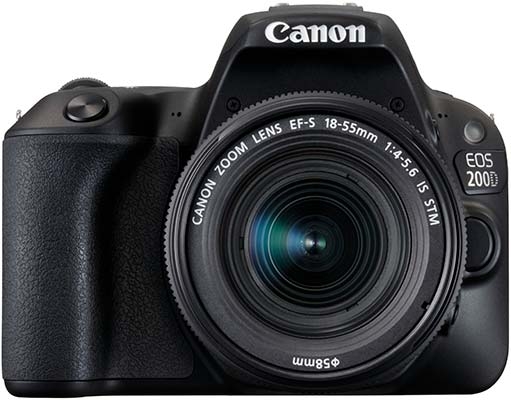Canon EOS 200D Review

Introduction
The Canon EOS 200D (called the Digital Rebel SL2 in North America) is the the world’s lightest DSLR camera with the world’s fastest AF system. The 24 megapixel 200D / SL2 offers Dual Pixel CMOS AF for the world’s fastest Live View focusing, a vari-angle screen with touchscreen capabilities, a 63-zone metering sensor, 9 auto-focus points, ISO range of 100-25,600 (expandable to 51,200), a guided user interface, DIGIC 7 processor and 5fps continuous shooting, and Bluetooth, NFC and Wi-Fi connectivity. The 200D’s video mode offers 1080p Full HD recording at 60/50/30/25/24fps with full manual control over exposure and gain.
The Canon EOS 200D is available in three colours - classic Canon Black, White, and Silver & Tan, and has an RRP of £579.99 / €719.99 body only. The EOS 200D can also be purchased with an EF 18-55mm kit with an RRP of £679.99 / €839.99. In the USA, the Canon EOS Rebel SL2 has a retail price of $549.99 for body only and $699.99 with the Canon EF-S 18-55m f/4-5.6 IS STM lens.
Ease of Use
The new EOS 200D / Digital Rebel SL2 is slightly bigger and heavier than the EOS 100D / Digital Rebel SL1 model that it replaces, measuring 122.4 x 92.6 x 69.8mm and weighing 453g, but it's still the the world’s smallest and lightest DSLR camera with a vari-angle screen. Despite its petite size, the control layout will be instantly familiar to anyone who's used a mid-range Canon DSLR before.
The EOS 200D has a much larger, more pronounced grip than its predecessor, something that we criticized the 100D for. You can now comfortably fit three of our average-sized fingers around the grip, with a little finger supporting the base of the camera, which offers enough support to use the camera with some of the bigger and heavier EF lenses.
In terms of build quality, the Canon EOS 200D / SL2 certainly feels solid enough for a consumer-grade DSLR, although as you'd perhaps expect not in the same league as the semi-professional models. Like all of Canon's APS-C digital SLR cameras, the EOS 200D / SL2 is compatible with the manufacturer's entire line-up of lenses, including both EF and EF-S glass. When changing lenses, EF lenses need to be aligned with the red dot on the lens mount, whereas EF-S lenses must be aligned with the white square.
We tested the EOS 200D with the new EF-S 18-55mm f/4-5.6 IS STM lens lens, which offers a fairly versatile focal range and crucially includes image stabilisation. This is important for Canon, as competitors like Sony, Olympus and Pentax all offer image stabilisation in their comparable cameras. The difference between Canon (and Nikon) and the others is that Sony, Olympus and Pentax have opted for stabilisation via the camera body, rather than the lens, which therefore works with their entire range of lenses. Canon's system is obviously limited by which lenses you choose, but it does offer the slight advantage of showing the stabilising effect through the viewfinder. Canon and Nikon also claim that a lens-based anti-shake system is inherently better too.
The 1,040,000-dot resolution of the rear LCD panel is identical in resolution to the 100D's display. The screen has an aspect ratio of 3:2 - i.e. identical to that of the sensor - so the photos fill the screen completely, with no black stripes along the top and bottom. The LCD screen is now mounted on an articulating hinge which means you can pull it out to face forwards, as well as tilting it downwards and upwards. This articulation is useful if you want to shoot from an awkward angle, but you will have to switch to using Live View in order to take advantage of it. The screen also folds into the body of the camera, which is great for keeping it protected from scratches and so on when not in use.

Front of the Canon EOS 200D
The EOS 200D / SL2 once again features a touch-screen. It supports a variety of multi-touch gestures, such as pinching and swiping, for choosing shooting modes, changing settings, tracking faces, selecting auto-focus points, and focusing and taking a picture in Live View mode. In playback you can swipe to move from image to image and pinch to zoom in and out, just like on an iPad or other tablet device. The ability to focus and take the shot with a single press of your finger on the screen makes it quick and easy to capture the moment.
This is what i really need. I have plan to purchase it soon. But i still quite not sure is this camera worth to buy? You know, like is there any other camera with better feature and performance than 200d in same price. The second thing i alway consider before buying this is this 200d can not support 4k.
That make me sas actually. Will be the most perfet if it does have 4k. I dont want to be dissappointed after i take this camera home. This will be my first dslr camera btw. Now i use nikon coolpix p900.
Do you have any suggestion for me? Should i buy this 200d or you have any better option?
Personally i love this camera.
Really good post. Thank you for sharing here.
Please visit my blog @astrovorg.
You can see nikon p900 result on my every photo.
Thank you
this is a best camera
Yes it is, thank you for replying. :)
Congratulations @entertainment99! You have completed some achievement on Steemit and have been rewarded with new badge(s) :
Click on any badge to view your own Board of Honor on SteemitBoard.
For more information about SteemitBoard, click here
If you no longer want to receive notifications, reply to this comment with the word
STOP